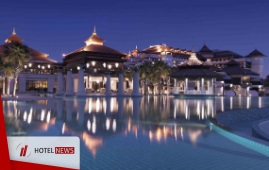
⭕️ Introducing the world's leading hotels 🎥 Anantara The Palm Dubai Resort 🔹Anantara Dubai The Palm Resort & Spa is set on the eastern crescent of the man-made marvel The Palm Jumeirah, this enchanting beachside resort is surrounded by lush gardens and consists of 293 beautifully appointed rooms and villas, inspired by Thai design in an Arabian setting. 🔹Anantara Dubai The Palm offers the only over-water villas in the United Arab Emirates, each set over the Arabian Gulf and complete with a glass viewing panel in the floor. 🔹The resort boasts beautiful views of tranquil lagoons or The Palm and is located close to a plethora of exciting Dubai attractions.
Create: Oct 26, 2020 Edit: Oct 26, 2020 TV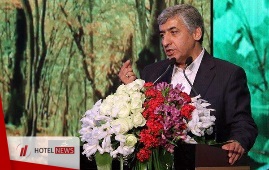
"Harmatullah Rafiei" President of the Iranian Air Travel and Tourism Services Association; Half a year has passed and tourism has reached the edge of extinction, but neither proper support nor rescue policies have taken place. The travel and tourism industry in Iran normally experiences a severe decline with the beginning of autumn and the end of the year. Tourism could be saved, but they preferred to do other things, such as starting private organizations and offering projects such as "apartment service".
Create: Sep 21, 2020 Edit: Sep 21, 2020 Regional News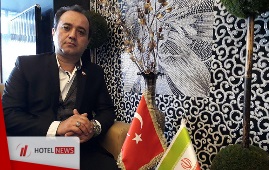
"Behzad Shojaei" reported in an interview with Hotel News; During negotiations with the CEO of the Asia Exhibition Company and the Turkish parties, the offer of this entry permit was made, which was also welcomed. It was decided that the issue of issuing entry permits to the city of Van for Iranian specialized centers and visitors in this exhibition will be reviewed and the final result will be announced. Restrictions and obstacles should not lead to the closure of tourism activities, but can be avoided with reasonable solutions to these challenges so that the tourism industry does not suffer from operational paralysis.
Create: Sep 5, 2020 Edit: Sep 6, 2020 Regional News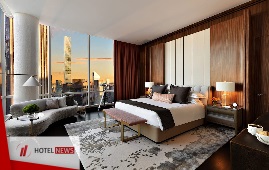
Technique 181 Understand When to Mention Your Hotel’s Name When Responding to Consumer Blogs; When responding to a negative online review, the name of the hotel should never be mentioned in the response. Con- versely, when responding to a positive online review, the name of the hotel should always be mentioned in the response. Technique 182 Understand When to Use “I” or “We” When Responding to Consumer Blogs; When responding to a negative online review, the hotel manager should use ‘I’ in the online response (e.g., ‘I will look into this issue’). The use of the word “I” signals owner- ship of the problem and resolution. On the other hand, when responding to a positive online review, the manager should use ‘we’ to spread the credit among the staff (e.g., ‘we are very glad that you enjoyed your stay’). Technique 183 Paraphrase the Problem When Responding to Negative Consumer Blogs; When responding to a negative online review, the hotel manager should paraphrase the guest’s concern in the online response. Such paraphrasing communicates to all those read- ing the response that the hotel has good listening skills. Technique 184 Include a ‘Relate’ Statement When Responding to Negative Consumer Blogs; When responding to a negative online review, the hotel manager should attempt to include a statement detailing how s/he can relate to the problem being communicated by the guest. Including a ‘relate’ statement communicates to all those reading the response that the hotel is empathetic to guests’ concerns. Technique 185 Require One New Idea Per Week; At every weekly management meeting, one manager should be required to share an innovative idea with the group that has never been attempted in the hotel. Technique 186 Graph Guest Problems According to Frequency and Seriousness; Guest problems should be tracked and plotted on a graph according to their frequency and seriousness. A cross-depart- mental team of 6–8 line-level associates and managers should be created to derive strategies for fixing the most pressing problems based upon frequency and/or seriousness. Technique 187 Text Mine Consumer Blogs for Trends; Hotel management should contract with a 3rd party ven- dor (e.g., Revinate) so that consumers’ blog postings can be analyzed for trends. Many of these 3rd party vendor products also enable management to monitor trends in competitors’ blog postings. Technique 188 Data Mine the Centralized Reservations System for Trends; Hotel management should data mine its centralized res- ervation system to identify non-obvious patterns and trends in guests’ habits and preferences. The results of such data mining can be used to better serve guests, but also to build an enhanced understanding of proper timing and placement of marketing messages. Chain affiliated hotels likely already have data mining services available to them. Managers at inde- pendent hotels can be taught some basic data mining func- tions by a consultant. The extent of data mining capabilities offered by 3rd party management companies appears to vary widely across the industry. Technique 189 Utilize the Front Desk as a Listening Post; Front desk associates should consider their work area a “listening post” from which they can overhear conversations between guests. Many guests may be reluctant to actively voice complaints to hotel staff, but discuss various issues among themselves (e.g., the ice machine was too noisy; the sidewalks leading to the parking lot were too icy). Such information should be entered into the logbook and denoted as “listening post feedback.”
Create: Sep 5, 2020 Edit: Oct 18, 2020 Hotel Management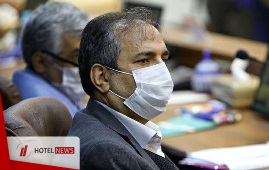
Jamshid Hamzehzadeh, President of the Iranian Hoteliers Association; Currently, many hotels in the country offer discounts of 50 to 60%, but still do not have customers. The basis for the increase in hotel rates is the annual inflation rate, but even last year, when inflation was announced at 53%, hotels increased their prices by 10 to 15%.
Create: Sep 5, 2020 Edit: Sep 5, 2020 Regional News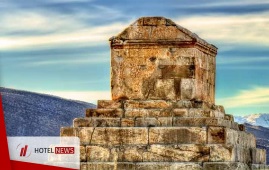
The La Vanguardia newspaper suggested destinations for the coronavirus outbreak and people who like to travel. Meanwhile, "George Sanchez" as a tourist from Spain who has traveled to five continents and 193 countries, has introduced Iran as one of the great choices for travel. He said: "Iran is a wonderful country with a history of thousands years and the most lovable and honest people in the world."
Create: Aug 22, 2020 Edit: Aug 26, 2020 International News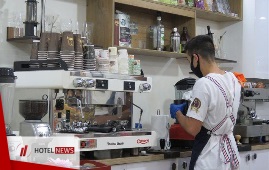
With the official permission of the Ministry of Tourism; Inauguration of the first educational institute for making beverages in Khuzestan province The company runs general hotel drink courses, including hot and cold drinks. The duration of this training course is 120 hours, of which more than 90% is offered in practice and the rest in theory. At the end of these training courses and by passing the exam, students will receive a valid certificate from the General Directorate of Cultural Heritage, Tourism and Handicrafts of Khuzestan Province.
Create: Aug 20, 2020 Edit: Aug 20, 2020 Regional News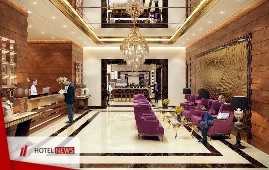
Technique 167 Post Positive Consumer Blog Posts for Employees to See; Employees like to be—and should be—recognized for out- standing guest service. In a section either in the staff lounge or near the time clock where the staff members tend to congre- gate, post all the positive comments including Trip Advisor, Social Media, Guest Survey’s, letters, etc. This will recognize employees who are getting good comments and will motivate other employees to give that extra service so they too can be recognized. Technique 168 Equally Reward Front and Back-of-the-House Employees; A front-of-the-house associate who is mentioned in a positive fashion on Trip Advisor should be given a reward. However, the recipient should be instructed to select a back- of-the-house associate who is worthy of receiving the equiva- lent reward. The front-of-the-house associate should be asked to write 2–3 sentences describing why the back-of-the-house associate is worthy of the reward. This explanation should be posted in the associate break-area (both associates are given an equivalent reward). Technique 169 Establish a Uniform and Appearance Committee; The hotel should have a “uniform and appearance com- mittee” comprised of a cross-section of managers and asso- ciates from across the hotel. The committee addresses issues regarding uniforms around the hotel. For example, should associates in a given department be permitted to wear long underwear tops on their arms in conjunction with a short sleeve uniform shirt or should long-sleeved uniform tops be issued? Knowing that fellow associates have an active voice in uniform policy provides incentive to comply. Technique 170 Conduct Guest Surprise Clinics with Associates; Hold a meeting with associates in which they are shown a PowerPoint slide presentation containing photographs of the various areas of the hotel. As the associates view the photos, they should be instructed to brainstorm ideas by which guests can be surprised in the given areas (A $2 cost limit for each surprise could be the parameter used in this exercise). Asso- ciates have more incentive to carry out surprise tactics if they take part in deriving the tactics. Technique 171 Have Employee Contests for Deriving Guest Surprise Ideas; Hang sketches (these are called service blueprints) of the hotel’s public areas in the associate break room. Associates who can offer the most creative ideas for surprising guests by studying the sketches can win prizes. Technique 172 Explain the Important Role of the Associate to His/Her Family; If an associate’s family members understand how the associate’s role in the hotel serves an important function in providing hospitality, then work-family conflict is reduced. Therefore, at least two times per year, management should plan a family function. During that function, management should explain to those in attendance how each associate’s job is important and how it fits into the functioning of the hotel. Technique 173 “I Love My Job When _____”; In an associate meeting, put the following sentence stem on a PowerPoint slide: “I love my job when _________.” Any associate who volunteers to stand in front of the group and completes the sentence wins a prize. Technique 174 Implement a Housekeeping Scoring Contest; For the housekeeping department, derive a scoring system on the room inspection check sheet. The housekeeper with the highest score across a seven-day period wins either cash or a gift card to a local retail store. Technique 175 Reward Departments for High Guest Satisfaction Scores; All departments should have team rewards such as pizza parties, luncheons, or gift cards when the department’s target guest satisfaction survey scores are met or exceeded.
Create: Aug 11, 2020 Edit: Sep 25, 2020 Hotel Management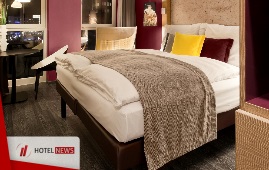
⚜️ As someone who spends well over 100 nights a year in hotels, I thought it was high time to put together a post with my thoughts about what every hotel room should offer (and what they definitely should not) in addition to all the basics like free WiFi, good personalized A/C and heating, and, you know, running water. Some of these are obvious – with the proliferation of lightweight laptops, smartphones, tablets and more, every hotel room should have an abundance of power outlets – while others might be more TPG-specific. However, these are things I’d like to see in every hotel room I book in the future, and feel free to share your own wish list below. 1. Power outlets galore . As I mentioned, we all travel with tons of gadgets these days, from computers and tablets to phones, cameras, music players and more, and the one thing they all have in common is that they must be charged. So it’s astonishing to me how many hotels still lack more than one or two outlets for guest use – you know, where lamps, phones and other odds and ends aren’t already plugged in. Not only that, but every hotel room should have bedside outlets. So many people tote their computers to bed to work while on the road for business, and so many use their Smartphones as alarm clocks (probably because hotel alarm clocks can be so byzantine to operate) that it just makes sense to have outlets near the bed that you can access without ripping the mattress away from the wall. Tons of lamps even come with outlets in their bases to make things easier. Hotels, take note, this should be a standard feature in your rooms. 2. A Nespresso machine . Call me a caffeine fiend, but I believe that every hotel room should have some sort of miniature coffee or espresso machine. Oftentimes, that’s all I want in the morning before grabbing something on the go from a lobby shop or a nearby cafe. I just want to be able to enjoy my first cup of the day in my room as I go through emails and my calendar without having to get dressed, leave the hotel and pick up coffee somewhere else. Or tea. Put in an electric kettle and some tea bags for the tea-drinkers out there. Who knows, maybe I’ll be feeling so productive I’ll order room service and up your revenue with a full-on breakfast if I feel like I’m getting a lot done. 3. A shower that doesn’t take advanced calculus to figure out how to work . Hotel showers can be glorious. Indoor showers, outdoor showers, showers with 12 showerheads, steam showers, rainfall showers…they’re all just wonderful. Except for one thing: so many of them are impossible to operate! Personally, I’m an old-fashioned, one knob for cold water and one for hot and you turn them to adjust the pressure and balance of temperature kind of guy. But so many hotel showers these days have temperature controls, pressure controls, controls to determine which showerhead is operating…I often find myself getting blasted with a rocket of cold water from one direction and volley of scalding drops from another these days. I mean, I love options as much as the next person, but can we please make these things easier to operate so I can get in, clean up and get out? And not to be too American about this, but would it be possible to include both Celsius and Fahrenheit temperatures on the knobs? I can do simple arithmetic on the fly with the best of them, but I don’t want to have to panic and try to figure out why 47 degrees is so hot. 4. Toothbrush and toothpaste . Call it a symptom of always being on the road, but I forget a toothbrush and toothpaste a lot when I travel and it would be such a nice surprise to find a mini travel kit in my hotel room when I arrive. If airlines can do it in amenity kits – and I’m not just talking business and first class ones here, but some airlines offer it in economy as well – then hotels can provide a mini oral hygiene set to guests. 5. Free water bottles . It’s midnight. You’re off a really long flight. You’re parched. All the stores are closed. All you want is a bottle of water, especially if you’re in a place where the water might not be potable for you. Any water will do – it doesn’t have to be Evian – but your only choices are in the minibar and they each cost $10. Why is that? Hotels need to start offering guests two free water bottles per day (that’s the other thing – even if you get a couple free bottles, it’s a one-time thing with a lot of hotels – once you drink them that’s it!). We would all appreciate it, and it’s such a simple provision. 6. A room service menu that doesn’t take 20 clicks on the TV screen to navigate and order from . This is another old-fashioned quirk of mine, but as much as I love new technology, sometimes just having a paper menu and calling down to room service is just so much easier than trying to learn to navigate a hotel’s “state of the art” television ordering system. If you’re going to put such a system in place, put an iPad in my room and let me order from there, which is so much easier. To be continue...
Create: Aug 9, 2020 Edit: Aug 11, 2020 Language Academy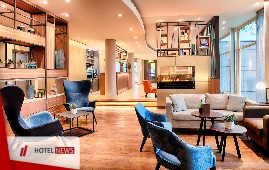
Technique 159 Hang Mirrors Outside Elevator Doors; Hang at least one mirror on each floor by the elevators. Perceived waiting time for the elevator is reduced when guests can look in mirrors. Technique 160 Greet Guests While They Are Waiting to Check-In; Perceived waiting time is reduced when a process begins. Because part of the check-in process is being greeted, when the front desk gets busy unexpectedly, a hotel representative from another department can greet and talk with guests as they wait in line. Technique 161 Tastefully Display Information Inside Elevators; The displaying of information inside guest elevators not only serves to reduce perceived waiting times but is also an outstanding opportunity for advertising your hotel and the area. Displaying appropriate and tasteful information can increase guest engagement. Technique 162 Offer Food and Beverage at the Front Desk When Busy; Providing something small to eat or drink ( e.g., cookie; infused water ) at the front desk serves to reduce perceived waiting times of guests at the desk. Technique 163 Create Strategic Alliances to Permit the Use of Hotel Key Cards at Local Attractions; The hotel should establish strategic alliances with local attractions by which the hotel’s room key can be used to gain admittance to the attractions. Such relationships could reduce/ eliminate the waiting that the guests would experience when purchasing tickets at the attractions. Technique 164 Have Pre-Printed Directions Readily Available; Do guests repeatedly ask for directions for the same place like getting on the highway, the big office park, etc.? The front desk agents should have small pieces of paper with the directions on them readily available. There is no wait for the employee to find it on the Internet and print it or take a time to explain it. Technique 165 Have Maps with Hotel Location Indicated on it; Tourists like to look at maps. Have a map with the hotel location already designated on it. This will save time and ques- tions by the guests and, of course, make it easier to identify where they are. If the guests need to converse with the desk staff they can, if not, they can look at the map and figure out where to go. Technique 166 Use Mobile Roulette Wheel to Reduce Perceived Waiting Times; If check-in gets busy unexpectedly, have an associate from another department roll in a mobile roulette type wheel. Have the guests waiting in line spin the wheel to determine which prize each wins. For example, prizes can range from 1–5 per- cent discounts on room rates.
Create: Jul 29, 2020 Edit: Sep 5, 2020 Hotel Management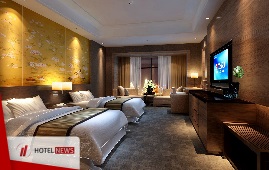
Technique 139 Ask About Travel Experiences; Offering redress for problems not caused by the hotel can be a key driver of guest satisfaction. For example, if a guest mentions travel-related problems experienced before arrival, the hotel should offer an amenity or upgrade as an expres- sion of empathy and comfort. Front desk associates should be encouraged to ask guests how their trips were because doing so increases the probability of finding out about travel-related frustrations. Technique 140 Thank Guests for Complaining; All associates should be trained to thank guests when they voice valid complaints. Such a thank you encourage guests to communicate problems directly with the provider as opposed to posting complaints on social media forums. Thanking the guest for voicing the complaint also signals that the problem is less likely reoccur in the future. Technique 141 Ask What Would Fix the Problem; If a guest voices a valid complaint, after listening, empa- thizing, thanking the guest, and apologizing, the hotel asso- ciate should ask the guest what the hotel can do to fix the problem. Most guests will ask for very little which presents the opportunity to deliver more than what was asked—spawning guest delight. Technique 142 Organize Recharging Cords; Recharging cords for mobile electronics are perhaps the most commonly left items in the rooms; thus, most hotels have excess in lost and found since many guests never call for them. Therefore, the hotel should have a selection already identified by phone/computer type. When a guest asks where to buy one, or if they ask to borrow one from the hotel, they will be readily available for them to use with no hassle. Technique 143 Be Ready for Clean-Up; The front desk agent should always have immediate access to both cloth towels and paper towels and should be on the look-out for guests in need of them. They can be offered if a guest comes in from the rain, if an infant spits up, etc. Technique 144 Have Shower Chairs and Bath Mats Readily Available; While all hotels have handicap rooms, at times, an elderly person or a person with an ailment may want “more protection” while in the shower. A shower chair and rubber bath mats are good to have on hand. Technique 145 Offer Hot Chocolate During Inclement Weather; Whether driving or flying, guests’ stress levels increase significantly when they must attempt to travel in snow or ice. Hot chocolate should be available in the lobby in such circumstances. Technique 146 Let Guests Keep Umbrellas; The hotel should have an abundance of umbrellas at the front desk for guests to use when needed. If a guest says s/he will drive the car around and return it later, let them keep the umbrella (they can be purchased inexpensively at a dollar store). Technique 147 Organize Unclaimed Items Suitable for Borrowing; Many times clothing, belts, etc. are left in lost and found. If the items remain unclaimed, they can be used for guests to borrow if forgotten to pack. A closet, or part of a closet, can be dedicated to these items. Technique 148 Be Informed About Guest Assistance Information; Guests continue to have more special needs as it relates to medical and dietary. Ensure that desk and restaurant staffs have the basic knowledge to assist the guests with these concerns. The key is where to direct them so they can get the information they need, such as what restaurant serves the needed food; pharmacy information; dentist information; or medical emergency information. To have information ahead of time will help when the need arises so the situation can be dealt with immediately. Technique 149 Have a List of Languages Spoken by Staff; Many hotel personnel speak multiple languages. Have a list of any employee that speaks different languages. When there is a guest who needs additional interpretation it will be helpful to know who the employees are that can help them. With foreign travel getting stronger, this is very valuable to the hotel. Technique 150 Have a System for Handling Verbal Communication Barriers; If an associate does not speak English, then s/he should carry cards to give to the guest so when they ask a question, they can explain this and direct them to someone who can help immediately. The staff member can also have a pen and paper readily available to help facilitate communication; be sure there is a system in place for this sort of communication. To ignore the guest is a failure in guest service. Technique 151 Recognize Employees for Exceptional Service Failure Recovery Efforts; If an associate goes the extra-mile to solve a guest’s prob- lem, take a digital photo of the associate and write a few sen- tence narrative about what s/he did in the situation. Use the narrative and photo to make a small poster that can be hung in the employee break room.
Create: Jul 5, 2020 Edit: Aug 13, 2020 Hotel Management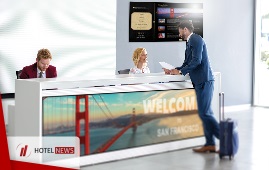
Technique 129 Encourage Fond Farewells from Housekeepers; All housekeepers should thank guests for their business and invite them to return when they see guests exiting down guestroom corridors. If a guest is rolling luggage down a cor- ridor in the AM hours, it is evident that s/he is checking out. Technique 130 Clean Guests’ Windshields; Each morning, the hotel should randomly select approx- imately 10 vehicles of guests who are checking out and clean their windshields. A note can be placed on the vehicle so that the departing guest will notice that the windshield has been cleaned. Technique 131 Offer Auto Snow/Ice Removal Tools; In cold climates, have snow/ice removal tools handy. When a guest checks out, these items will be useful for the guest’s vehicle. For added service, a staff member can clean the vehicle quickly for the guest. Technique 132 Offer Room Keys to Children as Souvenirs; When a guest is checking out with small children, the room key cards should be offered to the children as souvenirs. Children can even be offered craft kits so that they can deco- rate the key cards with jewels, stickers, or pipe cleaners while traveling home. Technique 133 Offer Children Coins Inscribed with the Hotel’s Logo; When a family with children is checking out, the children can be given gold or silver coins that are inscribed with the hotel name and logo. Technique 134 Let Guests Take $1 Bills; The front office manager should fill a glass fish bowl with $1 bills. One morning per week, the bowl can be placed on the front desk with a sign that reads: “If you are checking out, please take a few of these for the road.” The actual sight of cur- rency is actually much more powerful than simply discount- ing a guest’s folio. Technique 135 Inform Guests of Potential Bank-Related Issues Associated with the Use of Debit Cards; Debit Cards can be a challenge when using them at a hotel. Any guests using a debit card should be made aware of how the bank “holds” the money. It can be helpful to have the desk clerk explain this to the guest beforehand. No matter what experience the guest had at the hotel, if s/he has issues related to finances, such issues can ruin an otherwise positive experience. Technique 136 Offer to Store Items for Frequent Guests; If you have a guest that stays weekly, offer to store some of his/her items so that s/he do not have to take them home each week. Even if s/he does not want to utilize this service, the offer will likely mean a lot. Technique 137 Send a Gift Home to a Child; If a guest is traveling alone on business, but the property management system indicates that s/he has stayed in the past with a child then consider asking the guest if s/he would like a small gift to take home to the child. Technique 137 Give Some Fresh Vegetables or Herbs; If the hotel has a garden and a vegetable or fruit is ripe, offer the guest at check-out 1–2 pieces to take home (similar to how friends and family share items from their home gardens). Or, have a herb garden growing inside one or more lobby win- dows and ask the guest if s/he would like to cut some herbs to take home.
Create: Jun 23, 2020 Edit: Aug 13, 2020 Hotel Management
